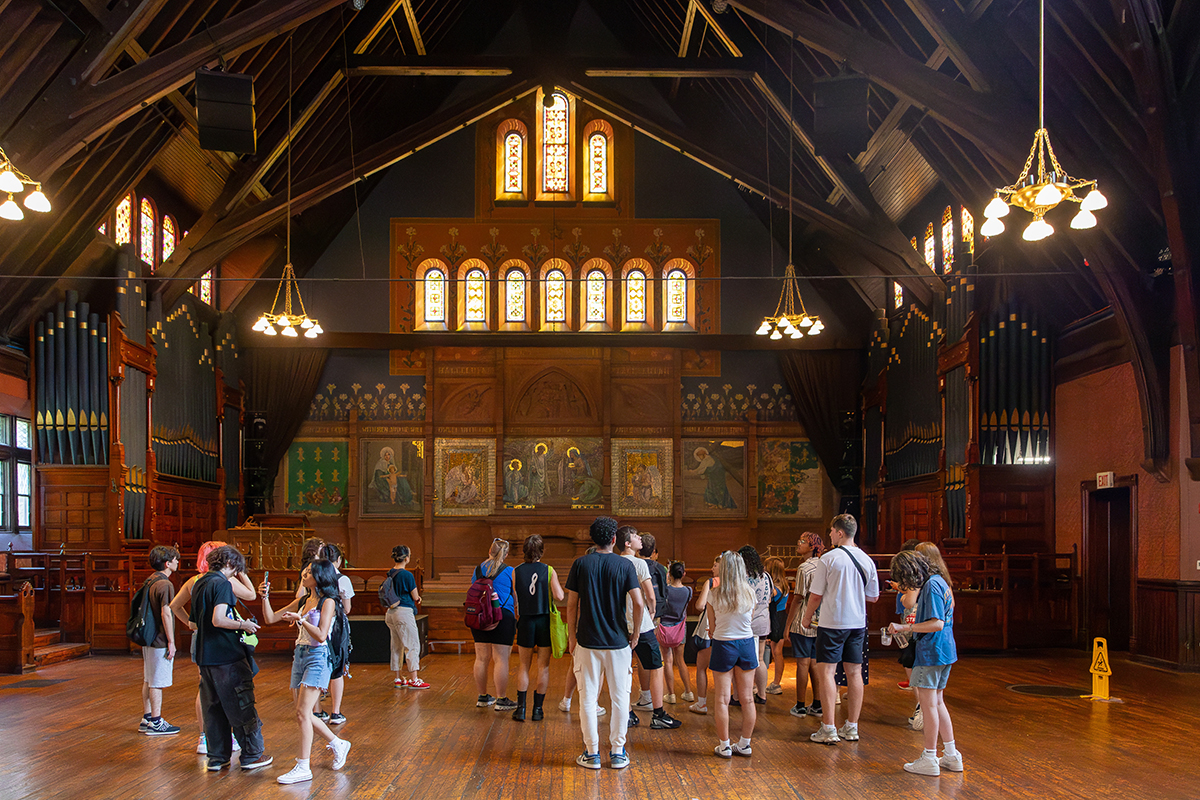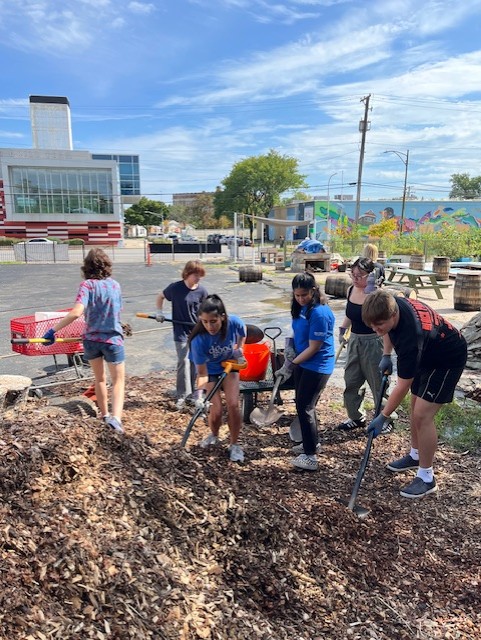 Discover students visit Epiphany Center for the Arts during Immersion Week. (Photo by Keeton Holder/DePaul University)
Discover students visit Epiphany Center for the Arts during Immersion Week. (Photo by Keeton Holder/DePaul University)
In 2022, U.S. News & World Report named DePaul’s Chicago Quarter one of the top first-year experience programs in the nation. The program, now in its 26th year, continues to be a staple of the DePaul experience.
A collaboration between the First-Year Program and the Office of New Student and Family Engagement, Chicago Quarter introduces first-year students to DePaul and Chicago. Experiential learning is at the core of the program — students go on excursions throughout the city to gain firsthand experience with its people, neighborhoods and institutions. For out-of-town students, these excursions are also an opportunity to learn how to navigate the city on foot, Divvy bike or the CTA.
“When we ask students about the most significant classes they took at DePaul, many of them will mention Chicago Quarter because that's where they first made friends here, where they first connected with the city and where they first got to know their university,” says Doug Long, director of the First-Year Program.
Discover and Explore Chicago courses are typically offered in the fall. Discover involves an excursion-heavy, five-day Immersion Week at the beginning of the quarter followed by seven weeks of instruction. Explore is a 10-week course operating on the regular fall class schedule with excursions dispersed throughout the quarter.
There are approximately 120 sections of Chicago Quarter courses this fall, each with a unique focus area. Course subjects span art, sports, culture and beyond. Some of this year’s newest offerings include “Disability in Chicago,” “Buddhist Chicago” and “Comics, Identity and Chicago.”
Unlike a typical class taught by one professor, Chicago Quarter courses are taught by a three-person teaching team consisting of an instructor, a Staff Professional and a Chicago Quarter Mentor.
“It's not common when students are starting college for them to be introduced to a faculty member, a staff member and another undergraduate peer,” says Yasmeen Nanlawala, associate director of New Student and Family Engagement. “The structure of the class is designed to help students connect with people at the university who can support them in their transition.”
Faculty lead the academic portion of the course and the Staff Professional and Chicago Quarter Mentor work together to deliver the Common Hour. This supplemental curriculum covers a range of topics, including transitioning to college, connecting to DePaul’s Vincentian mission and understanding and believing in oneself. Students explore these ideas through activities and assignments designed to prompt self-reflection and foster connection with their peers.
“A lot of research talks about how important it is to create a sense of belonging for students and how that affects their retention,” Nanlawala says. “Chicago Quarter is one of the strategic ways that the university helps create a sense of belonging for our first-year students.”
 Students in Adriane Stoner's "Love and Committed Relationships" course volunteer during Chicago Quarter Service Day. (Photo courtesy of Adriane Stoner)Adriane Stoner, an instructor in the College of Communication, began her journey with the Chicago Quarter program back in the nineties — as a student in one of the very first cohorts. Her experience motivated her to get involved as an instructor, and this fall marks her tenth year in the program.
Students in Adriane Stoner's "Love and Committed Relationships" course volunteer during Chicago Quarter Service Day. (Photo courtesy of Adriane Stoner)Adriane Stoner, an instructor in the College of Communication, began her journey with the Chicago Quarter program back in the nineties — as a student in one of the very first cohorts. Her experience motivated her to get involved as an instructor, and this fall marks her tenth year in the program.
Stoner's course, titled “Love and Committed Relationships, Chicago Style,” explores love in a range of contexts: from romantic love to familial love to compassion for one’s community.
“It really comes together because the students are in their first week of college, and they're in this liminal space of having experienced, in some sense, loss of old relationships,” Stoner says. “A lot of times it involves moving out of their family home for the first time while, at the same time, they're making all these new connections.”
During this year’s Immersion Week, Stoner took her students on excursions to the Art Institute, the Buddhist Temple of Chicago and iO Improv Theater. Each excursion was tied to a theme of the class, but they also allowed Stoner to connect with her students on a deeper level.
“You have those moments where you're sitting on a train or waiting for a bus and you get to talk to students about things that you wouldn't get to talk about in your regular classroom setting,” Stoner says.
Nanlawala serves as the Staff Professional for “Explore Muslim Chicago.” Like Stoner, she emphasizes the connections and new perspectives faculty and staff can gain from the program.
“It gives you a deeper understanding of what it's like to be a student here,” Nanlawala says. “For staff and faculty, it helps us do our jobs better because we’re hearing directly from students about how they’re engaging with different offices and resources.”
As program organizers look ahead to the next 25 years of Chicago Quarter, a continued commitment to diversity is guiding their work.
“With all aspects of the program — the course topics we're offering, the instructors and faculty that are teaching in the program, the staff and students that are part of the teaching teams — we want to continue to be representative of our student body and ensure that our courses and our teams are reflecting the diversity that exists at the university,” Nanlawala says.